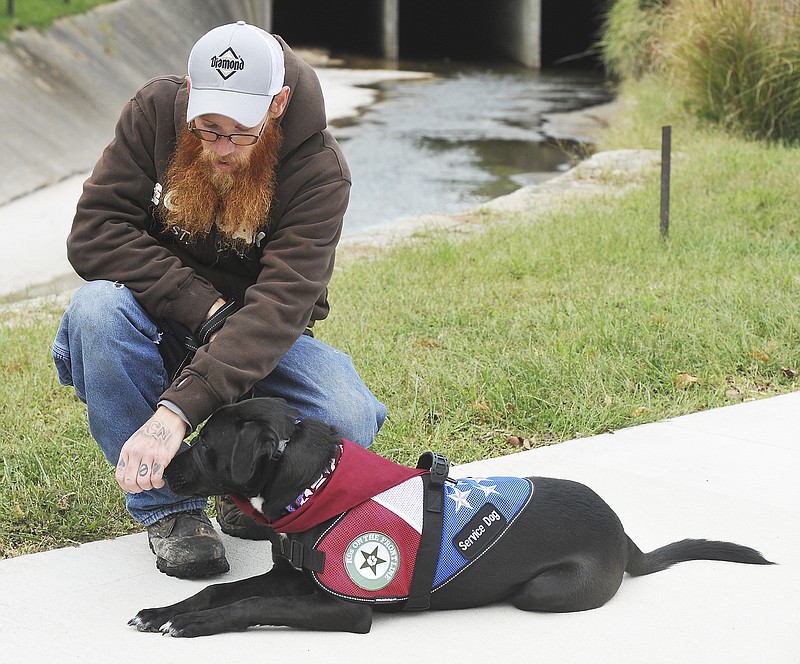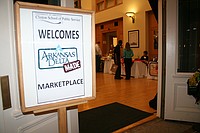Half a dozen U.S. veterans walked their dogs along downtown sidewalks Monday as part of a training exercise. The training was for the dogs - and the veterans.
Photo Gallery
Delta Made Marketplace
A marketplace showcasing Delta region artists and products held at the Clinton School of Public Service on Friday, March 6.
They are the first group of veterans in Missouri to take part in the program, which originated about three years ago in Maine and has served more than 150 veterans. Through the program, the organization provides certified, trained service dogs to military veterans affected by post traumatic stress disorder and/or traumatic brain injury.
Another goal of the organization is to save dogs from euthanasia. The organization harnesses the connection between dogs and humans to intercept humans' flashbacks and nightmares.
Veterans wishing to look into the program should visit k9sonthefrontline.org to see if they qualify.
Veterans in the program have received recommendations from doctors saying they should look into having a service dog, according to Jason Howe, the Midwest coordinator for the program.
"We have doctors write a letter saying the veteran would benefit from having a service dog," Howe said.
Donations pay for the program, which is free for veterans who qualify, he said.
After the client and an appropriate service dog are paired, they go through a 16-week training program that meets once a week for two hours at varying locations around the city. Early Monday, the group met at Premium Pets, 700 E. McCarty St.
While there, they worked on asking their dogs to stay while they walked away and spoke with Howe. Most dogs managed to remain where they were.
Veterans also worked on keeping the dogs' attention on their handlers as other dogs were led past.
In addition to the 32 hours of training the dogs receive during the class time, handlers are required to provide 120 hours of at-home training for the dogs - and to log it all. That means they have to work with the dog for at least an hour and a half every day.
"They write down what they're doing for training - what was successful and what needs work," Howe said.
Most of the dogs in Monday's class came from shelters. And, the program likes to begin with dogs they believe are about a year or two old, Howe said. The dogs belong to the veterans.
Howe watched to see whether Gypsy, a black, 9-month-old German shepherd sitting inside Premium Pets - near the entrance before teams went outside - reacted when each dog came in. She mostly remained calm as other dogs walked past, which was a dramatic change from the week before, Howe said.
"I like how she came in today," he said. "Usually, she's pretty reactive. She hasn't made a sound."
She was "focused" on her veteran, he said. That's a goal. If the dogs are concentrating on their handlers, they're blind to the rest of the world.
Gypsy's veteran, Lee Holmes, served in the U.S. Army and National Guard. A former Jefferson City police officer, he said he experiences PTSD-like symptoms.
He's had high levels of anxiety and panic attacks.
"I knew Jason from playing hockey," Holmes said. "He came to me and said dogs really help. Jason asked me what kind of dog I'd enjoy."
Holmes said he'd always wanted a black German shepherd.
As it turned out, folks with People Helping Paws - a cat and dog rescue in Jefferson City - had told him the night before about a black German shepherd in the St. Louis area. Howe went to assess the dog and determined it would be a good candidate for Holmes.
Gypsy and the veteran have connected, Holmes said.
"I don't know how," he said. "She always knows when I'm having a day. I really like having her around with me."
Player, a 2-year-old Bernese mountain dog, clearly the largest dog in the group, was being a bad dog Monday, according to his handler, Wendy Eiss, who was a master sergeant in the Air Force.
Eiss said Player will help with her PTSD and anxiety. But, on Monday, he wasn't cooperating. He was pulling on the leash and ignoring commands, she said.
Virgil Prenger, of Taos, a former specialist in the Army, said he served during Vietnam and suffers from PTSD. He recently had knee-replacement surgery and the doctors told him he could do anything he wanted. He wanted to go to bed. He slept on the couch for two weeks. Then Prenger, while sleeping, fell out of the bed and broke several bones.
The Veterans Health Administration recommended Prenger get a service dog, he said. And People Helping Paws found Daisy, a stray whippet-American bully mix.
Prenger said getting Daisy has made a big difference in his life. One morning, he woke and found her draped across him. Prenger figures she was trying to settle him down.
"She's a pretty good dog," he said. "She lays on the end of the bed every night."


